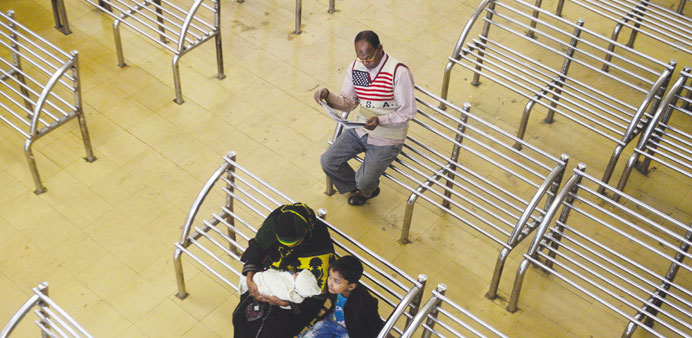Commuters waiting for a bus at a bus station during an ongoing blockade organised by the main opposition Bangladesh Nationalist Party (BNP) and its Islamist allies in Dhaka yesterday.
Bangladesh opposition parties yesterday called another nationwide transport blockade aimed at toppling the government, despite fears by business groups that the impoverished nation’s economy is being crippled.
The main opposition Bangladesh Nationalist Party (BNP) and its Islamist allies called the 72-hour blockade of rail and road transport to try to force Prime Minister Sheikh Hasina to resign and scrap a general election set for January 5.
Strikes and blockades have shuttered industries and halted transport over more than 20 days in total since the start of November. This has cost the economy more than $4 billion, according to three leading trade groups.
The garment industry, the mainstay of the economy with 4mn employees, has been hard hit with some Western customers said to be moving elsewhere.
“Western retailers are diverting their orders from Bangladesh to nations like India, Vietnam and Indonesia due to the political unrest,” said Reaz-Bin-Mahmood, vice president of the Bangladesh Garment Manufacturers and Exporters Association.
Farmers nationwide have been forced to dump milk and produce has been left rotting, with lorries unable to move them to towns and cities for sale, industry groups say.
Food prices have soared in cities due to disrupted supplies as Islamist activists and other opposition members, armed with crude bombs and weapons, blockade main roads in violent protests.
Protesters have also torn up railway tracks, derailing trains with occasionally fatal results.
At least 112 people have been killed since late October when the 18-party opposition movement launched the protests, calling on Hasina to resign so that a neutral caretaker government can supervise the election to ensure fairness.
Police Inspector Mahfuzur Rahman said that a protester from the Jamaat-e-Islami died of bullet wounds in Dhaka yesterday at the start of the latest blockade.
A auto-rickshaw driver, who was hit by a petrol bomb earlier this month, died of his injuries in a Dhaka hospital.
AFP had earlier interviewed the driver at a burns unit where he was receiving treatment. He is the 14th person to have died in the unit from burns from petrol and other home-made bombs used by protesters.
The caretaker government system was used successfully four times in the past 20 years in the coup-plagued country.
Hasina scrapped it in 2011 and has instead formed a multi-party interim cabinet—comprising her allies—to oversee the January 5 election, leading to fears among the opposition that she will rig the result.
Bangladesh has also been reeling from deadly violence sparked by the execution of a senior Islamist leader for war crimes, with hundreds taking to the streets to vent their fury.

